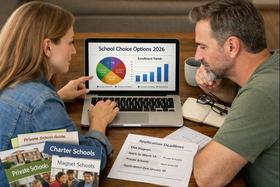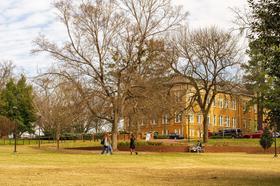Durham School of the Arts is a secondary magnet school located in downtown Durham, North Carolina, United States, housing 1,890 students. Its focus is on the visual and performing arts.
Serving 1,767 students in grades 6-12, Durham School Of The Arts ranks in the top 20% of all schools in North Carolina for overall test scores (math proficiency is top 20%, and reading proficiency is top 20%).
The percentage of students achieving proficiency in math is 71% (which is higher than the North Carolina state average of 51%). The percentage of students achieving proficiency in reading/language arts is 73% (which is higher than the North Carolina state average of 50%).
The student-teacher ratio of 16:1 is higher than the North Carolina state level of 15:1.
Minority enrollment is 64% of the student body (majority Hispanic), which is higher than the North Carolina state average of 57% (majority Black and Hispanic).
Quick Facts (2026)
- School Type: Magnet School
- Grades: 6-12
- Enrollment: 1,767 students
- Student-Teacher Ratio: 16:1
- Minority Enrollment: 64%
- Graduation Rate: 96% (Top 5% in NC)
- Overall Testing Rank: Top 20%
- Math Proficiency: 71% (Top 20%)
- Reading Proficiency: 73% (Top 20%)
- Science Proficiency: 71% (Top 50%)
- Source: National Center for Education Statistics (NCES), NC Dept. of Education
Top Rankings
Durham School Of The Arts ranks among the top 20% of public schools in North Carolina for:
Category
Attribute
Overall Rank
Most improved public schools
Math Proficiency
Reading/Language Arts Proficiency
Graduation Rate
Diversity
School Overview
Durham School Of The Arts's student population of 1,767 students has declined by 5% over five school years.
The teacher population of 111 teachers has stayed relatively flat over five school years.
School Type
Grades Offered
Grades 6-12
(Supplemental Virtual)
(Supplemental Virtual)
Total Students
1,767 students
Gender %
Total Classroom Teachers
111 teachers
Year Founded
1903
Colors
White, Black, Blue
Last Day of School
Mon. May 25, 2026
Campus Size
50 acres
School Motto
Truth and Honor
School Rankings
Durham School Of The Arts ranks within the top 20% of all 2,617 schools in North Carolina (based off of combined math and reading proficiency testing data).
The diversity score of Durham School Of The Arts is 0.72, which is more than the diversity score at state average of 0.71. The school's diversity has stayed relatively flat over five school years.
Overall Testing Rank
#311 out of 2617 schools
(Top 20%)
(Top 20%)
Math Test Scores (% Proficient)
(21-22)71%
51%
Reading/Language Arts Test Scores (% Proficient)
73%
50%
Science Test Scores (% Proficient)
71%
63%
Student-Teacher Ratio
16:1
15:1
American Indian
n/a
1%
Asian
3%
4%
Hispanic
31%
21%
Black
24%
25%
White
36%
43%
Hawaiian
n/a
n/a
Two or more races
6%
6%
All Ethnic Groups
Graduation Rate
(21-22)96%
86%
Participates in the National School Lunch Program (NSLP)
Yes
Eligible for Free Lunch
36%
68%
Eligible for Reduced Lunch
2%
1%
School Statewide Testing
School District Name
Source: National Center for Education Statistics (NCES), NC Dept. of Education
School Notes
- School Mascot: Wild Boars
Profile last updated: 02/09/2025
Frequently Asked Questions
What is Durham School Of The Arts's ranking?
Durham School Of The Arts is ranked #311 out of 2,617 schools, which ranks it among the top 20% of public schools in North Carolina.
What percent of students have achieved state testing proficiency in math and reading?
71% of students have achieved math proficiency (compared to the 51% NC state average), while 73% of students have achieved reading proficiency (compared to the 50% NC state average).
What is the graduation rate of Durham School Of The Arts?
The graduation rate of Durham School Of The Arts is 96%, which is higher than the North Carolina state average of 86%.
How many students attend Durham School Of The Arts?
1,767 students attend Durham School Of The Arts.
What is the racial composition of the student body?
36% of Durham School Of The Arts students are White, 31% of students are Hispanic, 24% of students are Black, 6% of students are Two or more races, and 3% of students are Asian.
What is the student-teacher ratio of Durham School Of The Arts?
Durham School Of The Arts has a student ration of 16:1, which is higher than the North Carolina state average of 15:1.
What grades does Durham School Of The Arts offer ?
Durham School Of The Arts offers enrollment in grades 6-12 (Supplemental Virtual).
What school district is Durham School Of The Arts part of?
Durham School Of The Arts is part of Durham Public Schools.
In what neighborhood is Durham School Of The Arts located?
Durham School Of The Arts is located in the Brightleaf neighborhood of Durham, NC.
School Reviews
2 10/10/2025
2/10 would not recommend. HIGHLY TOXIC!!!! teachers are rude, and students are disrespectful.
5 10/10/2025
The courses at DSA are differentiated depending on interest and motivation. We are extremely content with the faculty and their communication.
Review Durham School Of The Arts. Reviews should be a few sentences in length. Please include any comments on:
- Quality of academic programs, teachers, and facilities
- Availability of music, art, sports and other extracurricular activities
Recent Articles

Back-to-School Tech & Online Learning Readiness Checklist
A 2026 guide to back-to-school tech & online learning readiness, helping families prepare devices, connectivity, skills, and safety.

How Public Schools Prepare for College in High School
Learn how public schools prepare for college and what parents should look for as students begin high school. Updated for 2026.

School Choice in 2026: What Parents Must Know
Explore how school choice is reshaping U.S. education in 2026, with updated trends, enrollment data, costs, policies, and practical guidance for parents.









